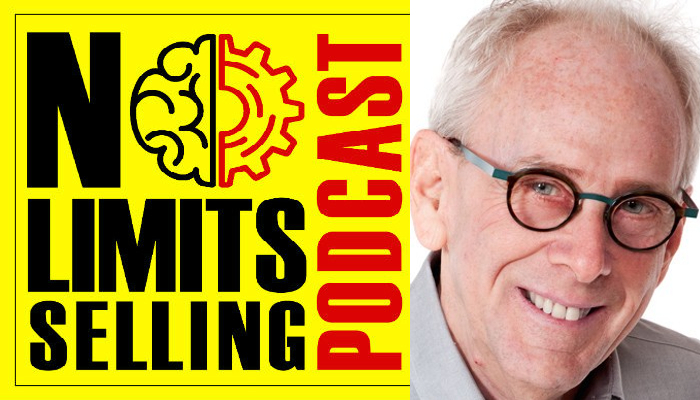How to Boost Sales Productivity Using These 4 Powerful Tactics
On Episode 161 of The No Limits Selling Podcast, we have Terry Ledden, a professional sales performance consultant, trainer, and coach for over 30 years. Terry has dedicated himself to the growth and development of consultative salespeople, sales managers, and their results.
Over half that time he resided in Chicago as VP of Sales and Marketing for Holden, a premier international sales training company working with Top Fortune 50 sales organizations at EDS, Bell Canada, IBM, XEROX, HP, Sprint, Unisys, Ernst & Young, and others.
In the early 2000s, Terry discovered Sandler’s unique training and consulting strategy proven to drive long-term, sustainable sales improvement. Acknowledging the failure of traditional 1 – 3 day training boot camps to deliver lasting quantifiable impact, he joined the global Sandler Training and Consulting team and adopted the model of incremental improvement over time, through shorter workshops at a higher frequency rate, spread over time.
His Sandler no-pressure conversational Selling System is a 180-degree pivot from traditional solution selling. It addresses the buyer pattern of withholding information from salespeople, stealing all their knowledge and expertise, lying about their intention to do business, and then entering witness protection when it comes time for the decision. The Sandler-trained sales pro gains the ability to control the Buyer–Seller's Dance, while applying principles from psychology and human dynamics to allow the buyer to feel comfortable, in control, and honest.
The Sandler Selling System takes the qualification process to a deeper level eliminating unintended waste of resources in generating quotes and proposals that will never close, best characterized as free solution consulting. Clients routinely see conversion rates from first contact to close rise between 30 – 170%.
Terry lives in Ottawa, Canada and when not driving full-out sales growth for his clients you’ll find him driving full out as a Certified Level II High-Performance Driving Instructor and Coach around motorsports road courses like Circuit Mt. Tremblant, Canadian Tire Motorsport Park (Mosport) and Ottawa’s Calabogie Motorsports Park.

Contact Terry:
[EDITOR’S NOTE: This podcast is sponsored by No Limits Selling. It is a fun, fast-paced podcast that delivers hard-fought business advice that you can implement today to improve your sales and performance]
Interested In Our Real Estate Coaching Services? Explore Our Website: Link
Feeling Not Well Today? You Can Use Our Mindset Boosters App To amp Up Your Mood: Link
Find us on Social Media:
LinkedIn | Facebook community | Instagram
Like what do you listen to? Subscribe to our podcast!
Ready to become fearless? We can help you become fearless in 60 days so you accomplish more in your career Schedule A 15 min Call with Umar
Summary
Introduction
The podcast begins with an introduction of Terry Ledden, a sales development expert and the founder of Sandler Training. Terry has a wealth of experience in sales and has worked with a variety of businesses to improve their sales processes and strategies. He is known for his practical and results-oriented approach to sales training.
Terry's Background and Experience
Terry shares his background and experience in sales, starting from his early days in the industry. He talks about the challenges he faced and the lessons he learned along the way. He also discusses his decision to start Sandler Training and the philosophy behind his approach to sales training.
The Importance of Sales Process
Terry emphasizes the importance of having a well-defined sales process. He explains that a good sales process helps businesses to identify and qualify prospects, manage sales conversations, and close deals more effectively. He also discusses the common mistakes that businesses make in their sales processes and provides tips on how to avoid them.
The Role of Mindset in Sales
Terry talks about the role of mindset in sales. He explains that a positive and resilient mindset is crucial for success in sales. He also discusses the common mental barriers that salespeople face and provides strategies for overcoming them.
Sales Techniques and Strategies
Terry shares some of his favorite sales techniques and strategies. He discusses the importance of active listening, asking the right questions, and understanding the customer's needs. He also talks about the importance of building relationships and trust with customers.
Conclusion
In this podcast, Terry Ledden, a seasoned sales development expert and the founder of Sandler Training, shares his wealth of knowledge and experience in the sales industry. He emphasizes the importance of a well-defined sales process, which aids businesses in identifying and qualifying prospects, managing sales conversations, and effectively closing deals. Terry also highlights the crucial role of a positive and resilient mindset in achieving sales success and discusses common mental barriers faced by salespeople along with strategies to overcome them.
He shares valuable sales techniques and strategies, such as active listening, asking the right questions, understanding customer needs, and building trust. In conclusion, Terry's insights underscore the importance of continuous learning, skill investment, and the cultivation of persistence and resilience in the realm of sales.
Questions & Answers
Who is Terry Ledden and what is his expertise in sales development?
What is the philosophy behind Terry Ledden's approach to sales training?
What is the importance of a well-defined sales process according to Terry Ledden?
How does mindset play a role in sales according to Terry Ledden?
What sales techniques and strategies does Terry Ledden recommend?
What is Terry Ledden's advice for businesses and salespeople?
What impact has Terry Ledden had on the sales industry?
Don’t miss this opportunity to transform your real estate career with one-on-one coaching. As an experienced real estate coach, I, Umar Hameed, am dedicated to helping you unlock your full potential and achieve your real estate goals. To learn more about who am I and my clients ↓
If you’re ready to take the next step, book an appointment with me today and begin your journey toward success in the real estate industry.
